高中英语人教版(新课程标准)必修4 Unit4 Body language Learning about language课件(46张PPT)
文档属性
| 名称 | 高中英语人教版(新课程标准)必修4 Unit4 Body language Learning about language课件(46张PPT) |  | |
| 格式 | zip | ||
| 文件大小 | 374.5KB | ||
| 资源类型 | 教案 | ||
| 版本资源 | 人教版(新课程标准) | ||
| 科目 | 英语 | ||
| 更新时间 | 2018-07-18 11:37:35 | ||
图片预览



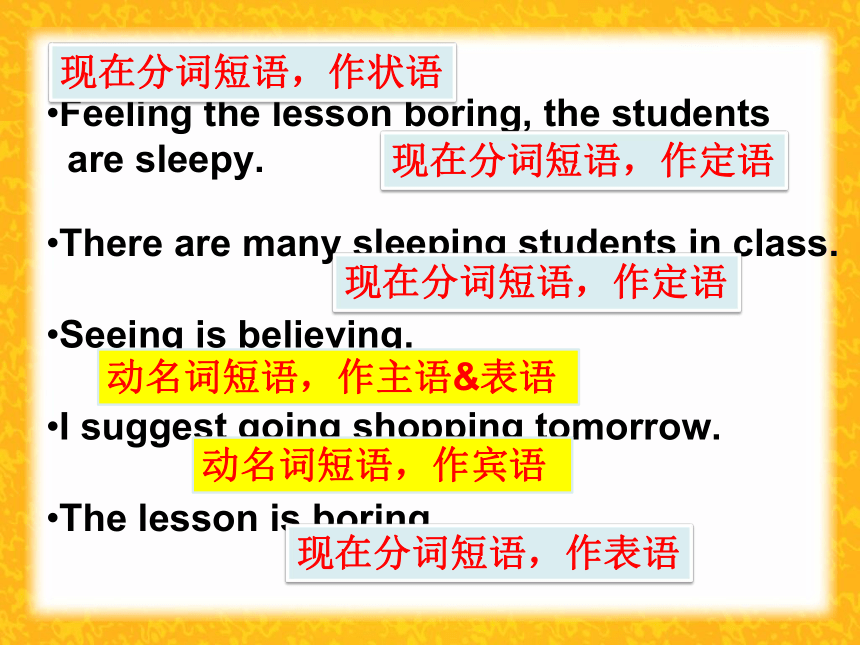
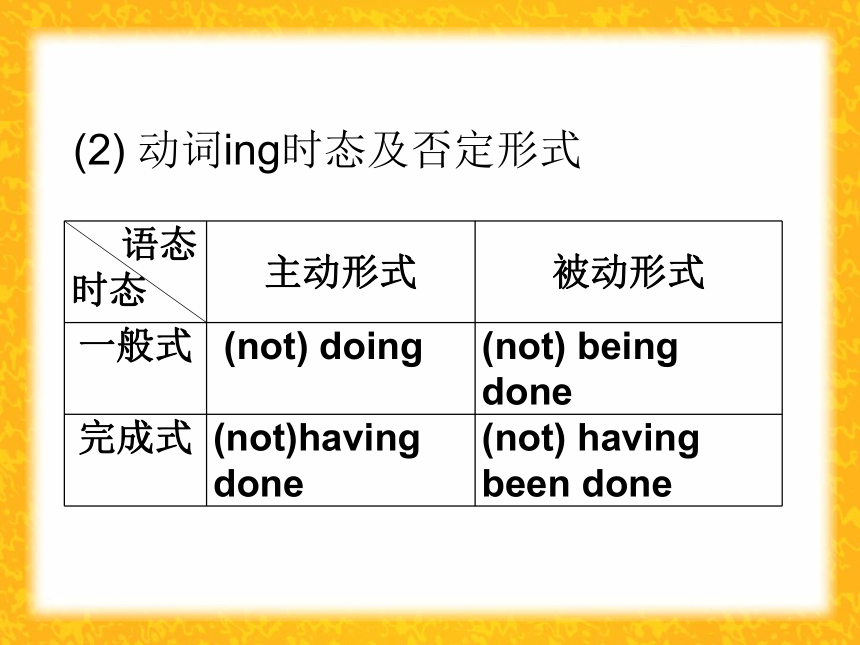




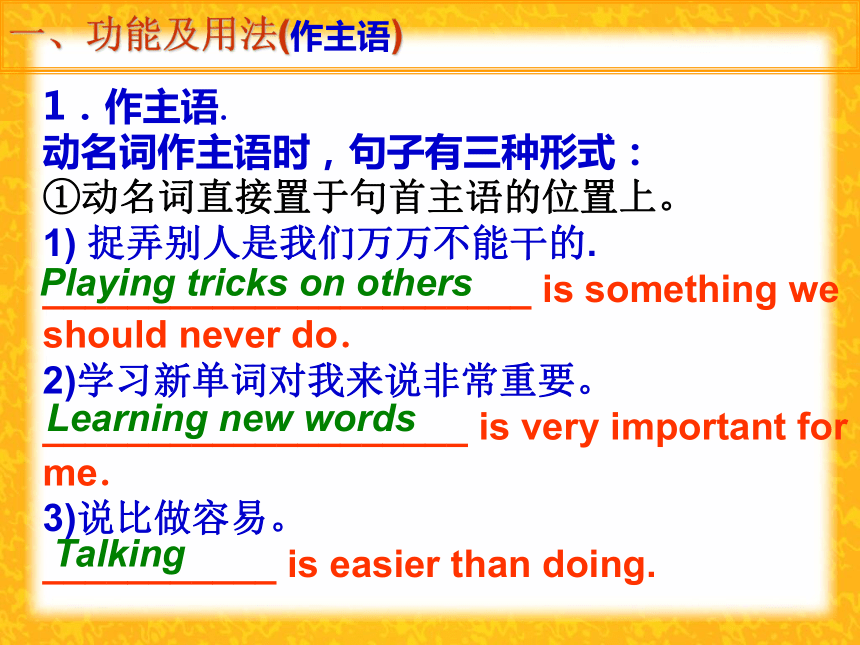
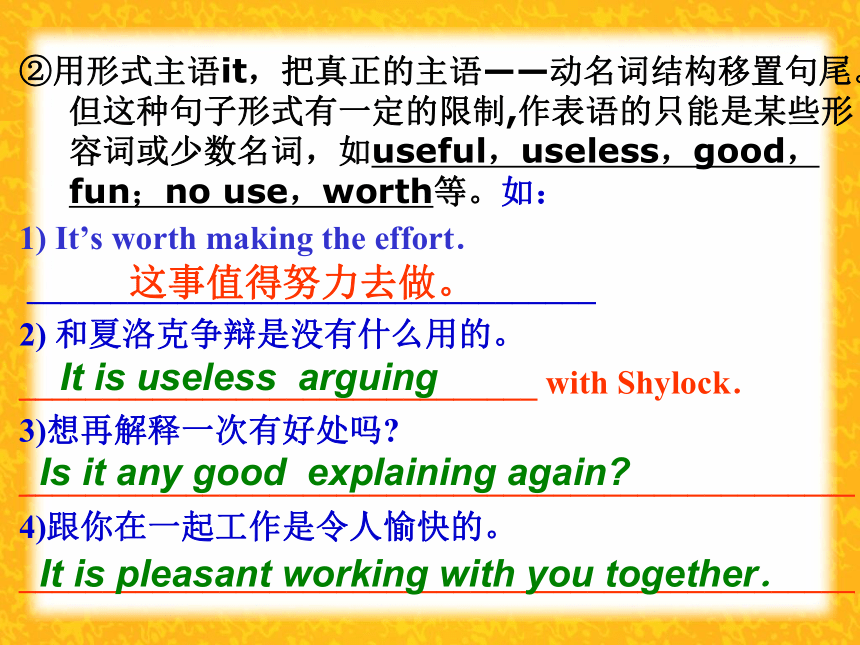
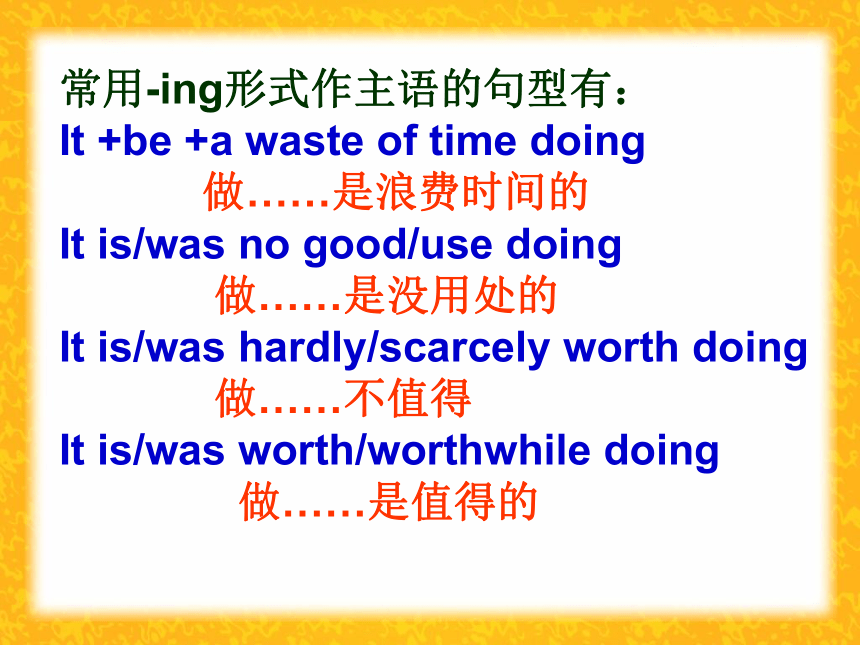
文档简介
课件46张PPT。必修四 Unit 2---Unit 4 语法详解
动名词和现在分词用法解析
V-ing一、V-ing 形式概念
(1) V-ing 形式包括两种:
①动名词:
具有名词特征,在句子中可作主语,宾语,
表语,定语等。
② 现在分词:
具有形容词和副词特征,在句子中可作
定语、状语、表语、宾补Speaking in the public , he will surely be
very cheerful .
(现在分词短语,作状语)
他在公众场所讲话时总是兴高采烈的。
She hates speaking in the public.
(动名词短语,作宾语)
她不喜欢在公众场所讲话。Feeling the lesson boring, the students
are sleepy.
There are many sleeping students in class.
Seeing is believing.
I suggest going shopping tomorrow.
The lesson is boring.
现在分词短语,作状语动名词短语,作主语&表语动名词短语,作宾语现在分词短语,作表语现在分词短语,作定语现在分词短语,作定语(2) 动词ing时态及否定形式 ? V-ing一般式表示这个动作正在进行或与
谓语表示的动作同时发生。
Eg:
They went out of the classroom, talking
and laughing.
The large building being built is a library.
? Ving完成式: 强调这个的动作在谓语动词
所表示的动作之前完成。
Eg:
Having lived in this city for three years,
she knows it very well.
Eg:
Having been shown the lab, we were
taken to see the library.
? 动词ing的否定形式在ing的前面加not 或
never的否定副词
Not knowing how to find the subway, I
asked a policeman for help.
Never have been to Beijjing before, she
felt at a loss where to go.
Grammar动词-ing形式作主语和宾语一、功能及用法(作主语)1.作主语.
动名词作主语时,句子有三种形式:
①动名词直接置于句首主语的位置上。
1) 捉弄别人是我们万万不能干的.
_______________________ is something we should never do.
2)学习新单词对我来说非常重要。
____________________ is very important for me.
3)说比做容易。
___________ is easier than doing.Playing tricks on othersLearning new wordsTalking②用形式主语it,把真正的主语——动名词结构移置句尾。但这种句子形式有一定的限制,作表语的只能是某些形容词或少数名词,如useful,useless,good,fun;no use,worth等。如:
1) It’s worth making the effort.
__________________________________
2) 和夏洛克争辩是没有什么用的。
_______________________________ with Shylock.
3)想再解释一次有好处吗?
__________________________________________________
4)跟你在一起工作是令人愉快的。
__________________________________________________It is useless arguingIs it any good explaining again?It is pleasant working with you together. 这事值得努力去做。 常用-ing形式作主语的句型有:
It +be +a waste of time doing
做……是浪费时间的
It is/was no good/use doing
做……是没用处的
It is/was hardly/scarcely worth doing
做……不值得
It is/was worth/worthwhile doing
做……是值得的
③在there be结构中作主语,这种结构的意思相当于“It is impossible to do… ” 如:
1) There is no hiding of evil but not to do it.
___________________________________
2)这种事开不得玩笑。
There is ________________ about such matter.
3)无法知道他什么时候离开。
There was _____________ when he would leave. no jokingno knowing若要人不知,除非己莫为。常用-ing形式作主语的句型有:
There is no doing
无法……, 不允许……
There is no sense in doing
做……没有道理
There is/was no use doing
干……无意义
There is/was nothing worse than doing
没有比……更糟的
There is/was no point doing
干……无意义动名词作主语与不定式作主语的区别:
动名词表示的动作通常是一个泛指的动作,
不定式则通常表示具体的动作。如:我喜欢看书,但是我现在想看电影。
I like_________,but now I like___________________ .readingto see a film1)还是个孩子的时侯,她就觉得探视病人是一种责任,也是一种愉悦。
As a child,she felt that _________________ was a duty and a pleasure.
2)到美国人家里做客对我来说将是一个极好的经历。
____________ in an American home will be a good experience for me. visiting sick peopleTo be a guest3) 一直不做就是作恶。
___________________is doing ill.
4)他说:“继续这样下去是无用的。”
He said,“__________ like this is no use.”
5)我很荣幸被邀请参加这个晚会。
It’s an honor for me ________ invited to the party.在实际运用中,一般两者可以互换,差异不大,但下列情况不能互换.Doing nothingTo go onto beThere was no knowing where we would go.
There is no point doing such a silly thing.注意:There is no need to do sth 干……没必要,
在此句式中to do 不可换为doing..
没有必要告诉她。
_______________________________________而在It’s important … / It’s necessary … / It’s advisable … / It’s essential … / It’s fitting … 这类句型中,只能用不定式,如:
It’s important to learn foreign languages.
It’s quite necessary to read it many times.There is no need to tell her.我们不知道要去哪儿。做这件傻事毫无意义。 动名词作宾语有两种情况。
一是有些动词只能后接动名词作宾语;
二是有些动词既可后接动名词也可后接不定式
作宾语。
①只能后接动名词作宾语的动词,常见的有
avoid,consider,enjoy,keep,finish,
suggest,dislike,delay,escape,
cannot help,imagine,mind, miss, practise,
cannot stand, excuse, fancy, give up, put off,
risk等。如:
1)我不能不去。I can’t avoid ________.
2)你是否考虑过找一位挚友? Have you
considered __________ one special friend? 二、功能及用法 (用作宾语)looking forgoing3)我们必须设法避免犯同样的错误。
We must try to _______________ the same mistake.
4)晚饭后你想和我一起散步吗?
Do you ______________________ with me after supper?
5)人们忍不住嘲笑那个愚蠢的人。
People _______________________________
foolish man. avoid repeatingfeel like having a walkcouldn’t help laughing at that②既可接动名词又可接不定式作宾语的动词,常见的有:begin,start,continue,like,love,prefer,by,mean,forget,remember,hate等。
A.在like,love,hate,prefer等动词之后,
用-ing或不定式意义上没有什么不同,只是侧重点
有些不同,动名词表示泛指的动作,不定式表示具
体的一次性动作。
B.在begin/start,continue之后,用动名词和不
定式,意义无甚区别,尤其是当主语是人的时候。
C.在动词forget,remember,regret之后,用动
名词与不定式意义不同。动名词表示动作先于谓语
发生,不定式表示后于谓语动作,如:
我记得我已把信寄了。
______________________________________________
2) 我会记着去寄信的。
______________________________________________
3) I shall never forget seeing the famous writer.
_____________________________________________
4)Don’t forget to write to your mother.
____________________________________________
5) 我真后悔没赶上那次报告会。
___________________________________________
6) 我遗憾地告诉你我不能接受你的建议。
____________________________________________我永远不会忘记见到过那位著名作家。 不要忘了给你母亲写信。I regret missing the report.I regret to say I can’t accept your advice.I remember posting the letter.I’ll remember to post the letter.D.在try,mean之后,意义各不相同,如try to do (设法),try doing (试试),mean to do (打算,有意要做),mean doing (意思是,意味着)。如:
1)We must try to get everything done in time.
_____________________________________________
2)我们用别的方法做这工作试试。
_______________________________________________.
3) I didn’t mean to make you angry.
_________________________________________________
4) Your plan would mean spending hours.
_________________________________________________我并不想让你生气。你的计划意味着要花费几个小时。 我们必须设法及时把一切搞好。 Let’s try doing the work in some other wayE· go on doing 和go on to do
go on doing继续做一直在做的事;
go on to do接着做另一件事。如:
1) 请接着做这同一个练习。
________________________ the same exercise.
2) 请做另外一个练习。
________________________ the other exercise.
F.stop doing与stop to do: Stop doing停止做,stop to do停下正在干的事去干另一件事。如:
我们停止了交谈。_____________________________
我们停了下来去谈话。________________________
Please go on doingPlease go on to doWe stopped talking.We stopped to talk.
G.注意:
当 need, want, require, worth后面接doing也可以表示被动。
Your hair wants cutting.
The floor requires washing.
This task is worth doing.
你的头发该理了。 地板需要冲洗这任务值得一做▲动词need, require, want意为“需要”时,
后跟动名词的主动式或不定式的被动式作
宾语,意义_____区别。如:
The window needs/requires/
wants cleaning/to be cleaned. 没有3.作介词宾语.动名词可与介词一起构成介词短语。
A.介词+动名词,如:
1) 我们得想些法子改变人们的习惯。
We’ve got to think of ways of __________ people’s habits.
2)我向你道歉,刚才对你那样生气。
I apologize for ____________ so angry with you.
3)离开几年之后再回到你生长的地方,感觉有点怪。
__________ away for several years,it is a strange experience to return to the place you were born and brought up. beingAfter beingchanging B.动词+介词+动名词,如:
1)我坚持为这次出行带足需要的食物。
I insist on ______proper food fort this expedition.
2)同学们脸上没有笑容,相反都做了怪脸。
_________________,each of them made a face.
她对为我们公司工作很感兴趣。
She was very ________________________ for our company.
下列短语中的to都是介词,所以后面跟名词或
-ing形式:devote to,object to, pay attention to,get down to,lead to, look forward to,stick to,be used to等 Instead of smiling interested in workingtaking1. It took the workmen only two hours to finish _______ my car. A. repairing B. repair C. to repair D. repairedExercise2. Have you forgotten ___$1000 from me last month? Will you please remember ____ it tomorrow? A. borrowing; to bring B. to borrow; bring
C. borrowed; bringing D. borrowing; bringing3. The classroom wants _____. A. clean B. cleaned C. to clean D. cleaning
4. Jack said that he wouldn't mind __ for us. A. to wait B. wait C. waiting D. waited5. My brother keeps ___ me with my work. A. to help B. help C. helping D. helped
6. We should often practise ___ English with each other.
A. to speak B. spoke C. speak D. speaking7. Keep on ____ and you will succeed. A. a try B. try C. triing D. trying
8. His parents insist on ___ to college. A. he should go B. he go C. his going D. him to go9. The story was so funny that we ___. A. couldn’t help laugh B. can’t but laugh C. couldn’t help laughing D. couldn’t help but to laugh10. Though it sounds a bit too dear (昂贵), it is worth ______. A. being bought B. buying C. to buy D. buying it
11. He devoted his life to _____ the atomic theory. A. study B. be studied C. studying D. have studied12. We are both looking forward to __ next week. A. going on vocation
B. go on vocation C. be going on vocation D. have gone on vocation13. You must pay attention to ___ the works of Lu Xun. A. read B. reading C. reader D. be read
14. You should work tonight instead of _____ TV. A. to watch B. you watching C. you watch D. watching15. The microscope is used for__ minute (微小的) objects. A. examining B. being examined C. examined D. examine
16. Mike has got used ___ up late at night. (stay up) A. to sit B. X C. to staying D. sitting17. Once the heart stops _____, death follows at once. A. beating B. to beat C. being beaten D. to be beating
18. We are now busy _____ for the examination. A. to prepare B. preparing C. prepared D. being prepared19. I remembered ____ this person somewhere before. A. seeing B. having been seen C. seen D. to see
20. I regret ____ that to her. A. having said B. to have said C. to say D. X21. The patient must be separated to avoid (避免) ____ others. A. being infected(感染) B. infecting C. to infect D. infected
22.Your clothes need ______. A. washed B. to be washed C. to wash D. being washed23. _____ provides us with essential nutrients (营养), while ______ provides us with oxygen. A. To eat; breathing B. Eating; to breathe C. Eating; breathing D. Eaten; breathed24. He attended the party without___. A. invited B. inviting C. having invited D. being invited
25. By ____, water can be changed into gas.
A. heating B. being heated C. having heated D. heated26. On land many objects prevent sound _____ very far. A. to travel B. travel C. from travelling D. to travelling
27. Remember__ the newspaper when you have finished it. A. putting back B. put back C. to put back D. be put back
28. Writing stories and articles__ what I enjoy most. A. is B. are C. was D. were 29. He was afraid ___for being late.
A. of seeing B. of being seen
C. to be seen D. to have seen
(1) V-ing 形式包括两种:
①动名词:
具有名词特征,在句子中可作主语,宾语,
表语,定语等。
② 现在分词:
具有形容词和副词特征,在句子中可作
定语、状语、表语、宾补Speaking in the public , he will surely be
very cheerful .
(现在分词短语,作状语)
他在公众场所讲话时总是兴高采烈的。
She hates speaking in the public.
(动名词短语,作宾语)
她不喜欢在公众场所讲话。Feeling the lesson boring, the students
are sleepy.
There are many sleeping students in class.
Seeing is believing.
I suggest going shopping tomorrow.
The lesson is boring.
现在分词短语,作状语动名词短语,作主语&表语动名词短语,作宾语现在分词短语,作表语现在分词短语,作定语现在分词短语,作定语(2) 动词ing时态及否定形式 ? V-ing一般式表示这个动作正在进行或与
谓语表示的动作同时发生。
Eg:
They went out of the classroom, talking
and laughing.
The large building being built is a library.
? Ving完成式: 强调这个的动作在谓语动词
所表示的动作之前完成。
Eg:
Having lived in this city for three years,
she knows it very well.
Eg:
Having been shown the lab, we were
taken to see the library.
? 动词ing的否定形式在ing的前面加not 或
never的否定副词
Not knowing how to find the subway, I
asked a policeman for help.
Never have been to Beijjing before, she
felt at a loss where to go.
Grammar动词-ing形式作主语和宾语一、功能及用法(作主语)1.作主语.
动名词作主语时,句子有三种形式:
①动名词直接置于句首主语的位置上。
1) 捉弄别人是我们万万不能干的.
_______________________ is something we should never do.
2)学习新单词对我来说非常重要。
____________________ is very important for me.
3)说比做容易。
___________ is easier than doing.Playing tricks on othersLearning new wordsTalking②用形式主语it,把真正的主语——动名词结构移置句尾。但这种句子形式有一定的限制,作表语的只能是某些形容词或少数名词,如useful,useless,good,fun;no use,worth等。如:
1) It’s worth making the effort.
__________________________________
2) 和夏洛克争辩是没有什么用的。
_______________________________ with Shylock.
3)想再解释一次有好处吗?
__________________________________________________
4)跟你在一起工作是令人愉快的。
__________________________________________________It is useless arguingIs it any good explaining again?It is pleasant working with you together. 这事值得努力去做。 常用-ing形式作主语的句型有:
It +be +a waste of time doing
做……是浪费时间的
It is/was no good/use doing
做……是没用处的
It is/was hardly/scarcely worth doing
做……不值得
It is/was worth/worthwhile doing
做……是值得的
③在there be结构中作主语,这种结构的意思相当于“It is impossible to do… ” 如:
1) There is no hiding of evil but not to do it.
___________________________________
2)这种事开不得玩笑。
There is ________________ about such matter.
3)无法知道他什么时候离开。
There was _____________ when he would leave. no jokingno knowing若要人不知,除非己莫为。常用-ing形式作主语的句型有:
There is no doing
无法……, 不允许……
There is no sense in doing
做……没有道理
There is/was no use doing
干……无意义
There is/was nothing worse than doing
没有比……更糟的
There is/was no point doing
干……无意义动名词作主语与不定式作主语的区别:
动名词表示的动作通常是一个泛指的动作,
不定式则通常表示具体的动作。如:我喜欢看书,但是我现在想看电影。
I like_________,but now I like___________________ .readingto see a film1)还是个孩子的时侯,她就觉得探视病人是一种责任,也是一种愉悦。
As a child,she felt that _________________ was a duty and a pleasure.
2)到美国人家里做客对我来说将是一个极好的经历。
____________ in an American home will be a good experience for me. visiting sick peopleTo be a guest3) 一直不做就是作恶。
___________________is doing ill.
4)他说:“继续这样下去是无用的。”
He said,“__________ like this is no use.”
5)我很荣幸被邀请参加这个晚会。
It’s an honor for me ________ invited to the party.在实际运用中,一般两者可以互换,差异不大,但下列情况不能互换.Doing nothingTo go onto beThere was no knowing where we would go.
There is no point doing such a silly thing.注意:There is no need to do sth 干……没必要,
在此句式中to do 不可换为doing..
没有必要告诉她。
_______________________________________而在It’s important … / It’s necessary … / It’s advisable … / It’s essential … / It’s fitting … 这类句型中,只能用不定式,如:
It’s important to learn foreign languages.
It’s quite necessary to read it many times.There is no need to tell her.我们不知道要去哪儿。做这件傻事毫无意义。 动名词作宾语有两种情况。
一是有些动词只能后接动名词作宾语;
二是有些动词既可后接动名词也可后接不定式
作宾语。
①只能后接动名词作宾语的动词,常见的有
avoid,consider,enjoy,keep,finish,
suggest,dislike,delay,escape,
cannot help,imagine,mind, miss, practise,
cannot stand, excuse, fancy, give up, put off,
risk等。如:
1)我不能不去。I can’t avoid ________.
2)你是否考虑过找一位挚友? Have you
considered __________ one special friend? 二、功能及用法 (用作宾语)looking forgoing3)我们必须设法避免犯同样的错误。
We must try to _______________ the same mistake.
4)晚饭后你想和我一起散步吗?
Do you ______________________ with me after supper?
5)人们忍不住嘲笑那个愚蠢的人。
People _______________________________
foolish man. avoid repeatingfeel like having a walkcouldn’t help laughing at that②既可接动名词又可接不定式作宾语的动词,常见的有:begin,start,continue,like,love,prefer,by,mean,forget,remember,hate等。
A.在like,love,hate,prefer等动词之后,
用-ing或不定式意义上没有什么不同,只是侧重点
有些不同,动名词表示泛指的动作,不定式表示具
体的一次性动作。
B.在begin/start,continue之后,用动名词和不
定式,意义无甚区别,尤其是当主语是人的时候。
C.在动词forget,remember,regret之后,用动
名词与不定式意义不同。动名词表示动作先于谓语
发生,不定式表示后于谓语动作,如:
我记得我已把信寄了。
______________________________________________
2) 我会记着去寄信的。
______________________________________________
3) I shall never forget seeing the famous writer.
_____________________________________________
4)Don’t forget to write to your mother.
____________________________________________
5) 我真后悔没赶上那次报告会。
___________________________________________
6) 我遗憾地告诉你我不能接受你的建议。
____________________________________________我永远不会忘记见到过那位著名作家。 不要忘了给你母亲写信。I regret missing the report.I regret to say I can’t accept your advice.I remember posting the letter.I’ll remember to post the letter.D.在try,mean之后,意义各不相同,如try to do (设法),try doing (试试),mean to do (打算,有意要做),mean doing (意思是,意味着)。如:
1)We must try to get everything done in time.
_____________________________________________
2)我们用别的方法做这工作试试。
_______________________________________________.
3) I didn’t mean to make you angry.
_________________________________________________
4) Your plan would mean spending hours.
_________________________________________________我并不想让你生气。你的计划意味着要花费几个小时。 我们必须设法及时把一切搞好。 Let’s try doing the work in some other wayE· go on doing 和go on to do
go on doing继续做一直在做的事;
go on to do接着做另一件事。如:
1) 请接着做这同一个练习。
________________________ the same exercise.
2) 请做另外一个练习。
________________________ the other exercise.
F.stop doing与stop to do: Stop doing停止做,stop to do停下正在干的事去干另一件事。如:
我们停止了交谈。_____________________________
我们停了下来去谈话。________________________
Please go on doingPlease go on to doWe stopped talking.We stopped to talk.
G.注意:
当 need, want, require, worth后面接doing也可以表示被动。
Your hair wants cutting.
The floor requires washing.
This task is worth doing.
你的头发该理了。 地板需要冲洗这任务值得一做▲动词need, require, want意为“需要”时,
后跟动名词的主动式或不定式的被动式作
宾语,意义_____区别。如:
The window needs/requires/
wants cleaning/to be cleaned. 没有3.作介词宾语.动名词可与介词一起构成介词短语。
A.介词+动名词,如:
1) 我们得想些法子改变人们的习惯。
We’ve got to think of ways of __________ people’s habits.
2)我向你道歉,刚才对你那样生气。
I apologize for ____________ so angry with you.
3)离开几年之后再回到你生长的地方,感觉有点怪。
__________ away for several years,it is a strange experience to return to the place you were born and brought up. beingAfter beingchanging B.动词+介词+动名词,如:
1)我坚持为这次出行带足需要的食物。
I insist on ______proper food fort this expedition.
2)同学们脸上没有笑容,相反都做了怪脸。
_________________,each of them made a face.
她对为我们公司工作很感兴趣。
She was very ________________________ for our company.
下列短语中的to都是介词,所以后面跟名词或
-ing形式:devote to,object to, pay attention to,get down to,lead to, look forward to,stick to,be used to等 Instead of smiling interested in workingtaking1. It took the workmen only two hours to finish _______ my car. A. repairing B. repair C. to repair D. repairedExercise2. Have you forgotten ___$1000 from me last month? Will you please remember ____ it tomorrow? A. borrowing; to bring B. to borrow; bring
C. borrowed; bringing D. borrowing; bringing3. The classroom wants _____. A. clean B. cleaned C. to clean D. cleaning
4. Jack said that he wouldn't mind __ for us. A. to wait B. wait C. waiting D. waited5. My brother keeps ___ me with my work. A. to help B. help C. helping D. helped
6. We should often practise ___ English with each other.
A. to speak B. spoke C. speak D. speaking7. Keep on ____ and you will succeed. A. a try B. try C. triing D. trying
8. His parents insist on ___ to college. A. he should go B. he go C. his going D. him to go9. The story was so funny that we ___. A. couldn’t help laugh B. can’t but laugh C. couldn’t help laughing D. couldn’t help but to laugh10. Though it sounds a bit too dear (昂贵), it is worth ______. A. being bought B. buying C. to buy D. buying it
11. He devoted his life to _____ the atomic theory. A. study B. be studied C. studying D. have studied12. We are both looking forward to __ next week. A. going on vocation
B. go on vocation C. be going on vocation D. have gone on vocation13. You must pay attention to ___ the works of Lu Xun. A. read B. reading C. reader D. be read
14. You should work tonight instead of _____ TV. A. to watch B. you watching C. you watch D. watching15. The microscope is used for__ minute (微小的) objects. A. examining B. being examined C. examined D. examine
16. Mike has got used ___ up late at night. (stay up) A. to sit B. X C. to staying D. sitting17. Once the heart stops _____, death follows at once. A. beating B. to beat C. being beaten D. to be beating
18. We are now busy _____ for the examination. A. to prepare B. preparing C. prepared D. being prepared19. I remembered ____ this person somewhere before. A. seeing B. having been seen C. seen D. to see
20. I regret ____ that to her. A. having said B. to have said C. to say D. X21. The patient must be separated to avoid (避免) ____ others. A. being infected(感染) B. infecting C. to infect D. infected
22.Your clothes need ______. A. washed B. to be washed C. to wash D. being washed23. _____ provides us with essential nutrients (营养), while ______ provides us with oxygen. A. To eat; breathing B. Eating; to breathe C. Eating; breathing D. Eaten; breathed24. He attended the party without___. A. invited B. inviting C. having invited D. being invited
25. By ____, water can be changed into gas.
A. heating B. being heated C. having heated D. heated26. On land many objects prevent sound _____ very far. A. to travel B. travel C. from travelling D. to travelling
27. Remember__ the newspaper when you have finished it. A. putting back B. put back C. to put back D. be put back
28. Writing stories and articles__ what I enjoy most. A. is B. are C. was D. were 29. He was afraid ___for being late.
A. of seeing B. of being seen
C. to be seen D. to have seen
同课章节目录
